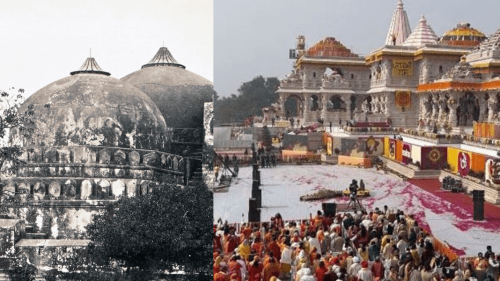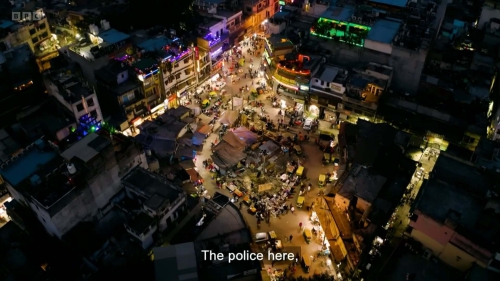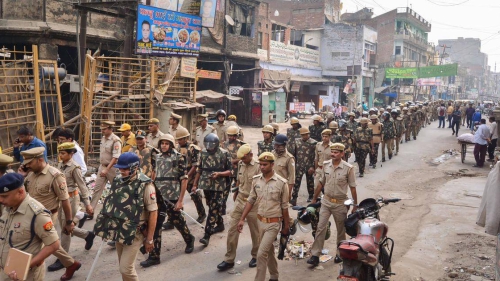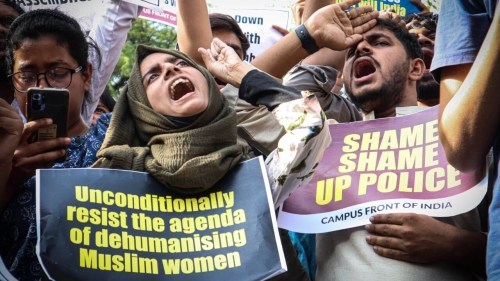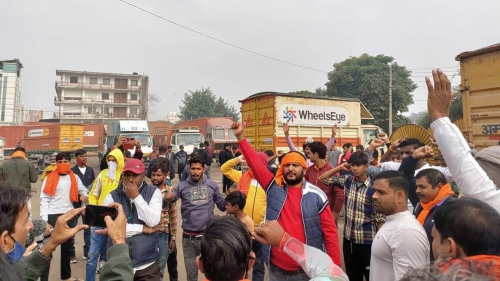India's 2024 Elections: A Crossroads for Democracy or Descent into Apartheid?

General elections are expected to be held in India between April and May 2024 to elect 543 members of the Lok Sabha. Will this year’s elections deliver a change for better?
The 2019 elections have transformed India from what was a de-facto apartheid democracy into a kind of de-jure apartheid democracy. But they also marked a shift toward authoritarianism in which opposition voices are muffled. Most media moguls in today’s India are businessmen supporting the BJP who have become promoters of Modi’s authoritarian regime, crony capitalism, and Hindutvadi agenda.
Consequently, if the government is not happy with some of the journalists, they ask the businessmen to remove those journalists unless they ‘fall in line’. 1Press freedom in India has declined under the Modi government: NPREven serious matters of anti-Muslim and anti-Christian prejudice and persecution by the government and its Hindu vigilantes are, therefore, either ignored or under reported.
In this environment of mass frenzy, hatred, and prejudice, no one dares to speak out against the excesses of the Modi government, as if such populist programs, which are dehumanizing to religious minorities are part of a national agenda to make India great again. Many of the political opponents of Modi have been coopted to join his party to be politically relevant in this toxic environment. The critics say that Modi has been transformed into an ‘overbearing, cult-like’ personality who is above the law.
Today, India lacks the civil society to challenge such serious aberrations of a government that is making all its neighbors nervous and worried about the ripple effects. Many liberal and secular academics and news reporters face threat to their lives for just airing their views that India is heading in wrong direction under Modi and the BJP.
Many experts who had earlier celebrated the multiculturalism of Indian existence and the capacious nature of the Indian constitution are now seriously concerned about the waning of those values under Modi. Consider, for instance, the remarks of Professor Amartya Sen on the health of Indian democracy in an interview with the New Yorker in 2019.
He said that “The big thing that we know from John Stuart Mill is that democracy is government by discussion, and, if you make discussion fearful, you are not going to get a democracy, no matter how you count the votes. And that is massively true now. People are afraid now. I have never seen this before.” 2Amartya Sen’s Hopes and Fears for Indian Democracy | The New Yorker
India has been depicted as a country of ‘particular concern’ because of her horrible records on human rights of hundreds of millions of her own citizens that are religiously different.3India - United States Department of State: 2021 Report on International Religious Freedom: India. June 2, 2022; India - United States Department of State: 2022 Report on International Religious Freedom: India. May 15, 2023. These accusations have become louder and more transparent these days since BJP’s coming to power, not only at the local level but also at the national level.
The Ram Mandir, an unfinished Hindu temple, was consecrated on January 22, 2024, on a contested holy site with an eye to the 2024 elections. The site once housed the 16th century Babri Mosque in India’s northern city of Ayodhya. That mosque, a monument of faith for Indian Muslims, was razed by a Hindu nationalist mob in 1992.
On 14 January 1992, less than a year before the mosque was destroyed, Modi had pledged not to return to Ayodhya until a temple dedicated to Lord Ram was completed. He was part of the 'yatra' for the integration of Kashmir with India, which was accomplished under his watch in 2019 when
Article 370 was abrogated. On that day, he raised cries of 'Jai Shri Ram', and participated in the worship of Hindu deity Ram, who was then housed in a makeshift tent. Nearly three decades later, Modi oversaw the groundbreaking of the temple, likening it to “the day India gained independence.”
For Narendra Modi, the construction of the Ram Temple represents more than just the honoring of a decades-long Hindu nationalist pledge. It also cements his legacy as one of the country’s most consequential leaders—in particular, one who is helping to transform India from a secular democracy into an avowedly Hindu nation.
“His entire career has been based on Ayodhya because he realized early on that the only way to become a favorite of the masses is to endear them through the Ram Temple movement,”
Journalist Rana Ayyub says. “This is the ultimate movement of Modi as a Hindu nationalist leader, and this is the ultimate moment of creating the Indian Muslim as a second-class citizen.” 4Why Modi's Temple of Ram in Ayodhya, India Is Controversial | TIME Critics of Modi accuse him of weaponizing religion for political gains.
The temple consecration followed a number of other major political moves implemented by Modi in his efforts to advance his government’s Hindu nationalist or Hindutvadi agenda. As already hinted above, this included the passage of the contentious Citizenship Amendment Act in 2019 (a law extending Indian citizenship to religious minorities from neighboring countries that excludes Muslims, undermining India’s constitutionally mandated secularism) and the repeal of the special autonomous status of India-administered Kashmir, the country’s sole Muslim-majority state.
“What unites these three things is that they work against Indian Muslims and Muslims more broadly,” says Michael Kugelman, the director of the South Asia Institute at the Wilson Center in Washington, “and, by extension, strengthen the status and interests of Indian Hindus.”
Nilanjan Mukhopadhyay, author of “The Demolition and the Verdict,” a book about the 1992 Babri Mosque demolition, said Modi’s decision to preside over January 22 festivities was a sign of Hindu hegemony in India.
Surely, neither the demolition of the historic mosques like the Babri Masjid nor the consecration of Hindu temples like the Ram Mandir will be the last of its kind in what many observers see a blatant attempt by the Modi government to push a pro-Hindu agenda and cement Hindu hegemony or supremacy over India.
Predictably, on January 31, 2024, a court in Varanasi, which is Prime Minister Narendra Modi's parliamentary constituency in northern Uttar Pradesh state, said Hindus can offer prayers in the Gyanvapi Masjid, a 17th century mosque in Varanasi.
Many Hindus believe that Modi is going to deliver them the mythical Ram Rajya. On the other hand, India’s hundreds of millions of religious and ethnic minorities see the transformation of their country quite differently. They believe that they are living under a highly oppressive, apartheid system, which is characterized by an authoritarian political culture that allows India to be dominated politically, socially and economically by her Hindu majority while the religious and ethnic minorities are treated as unequal in a stratified system.
As India goes to the poll, an important question for her voters is: can anything good come out of the belly of a hideous, apartheid system that is built upon hatred and intolerance and a highly flawed judicial system that is biased against its minorities, and shields the bigwigs and Hindu extremists, and is abused by the ruling party to act as its rubber-stamp to materialize its highly divisive agenda?
In the international front, the Government of India aspires to be a veto wielding power within the United Nations Security Council (UNSC). Such an aspiration is seen as preposterous and would continue to be rejected by the UN member states unless human rights are ensured for all its citizens, irrespective of ethnicity, caste, and creed. This is a serious matter that concerns everyone, and not just the 1.4 billion Indians.
The latter need to take a hard look and ponder on the vital question: can our world afford to have another apartheid state, albeit the most populous country in our time, where hundreds of millions of religious and ethnic minorities feel insecure and unwanted? Can the world support a partner whose judiciary is pressured by the executive in unconstitutional ways?
If the people of India are serious to amend the way India is perceived by the rest of the world, they must reverse the current developments inside their country through ballots. For surely, the rest of the world is gravely concerned about the direction that India is heading. They see the ruling BJP, under the leadership of Modi, flirting with Hindutva, which is considered by many experts as nothing but the Hindu version of fascism. If such perceptions are true, then we have not seen the worst yet.
After all, European fascism has been destructive and murderous, let alone being genocidal. No thinking man can afford to see a resurrection of fascism that denies the rights of “others”. A failed ideology cannot be thought to be a savior for any people, and surely not for a billion plus impoverished people who deserve much better.
The embrace of such a poisonous ideology as a national redeemer, some 75 years after the Universal Declaration of Human Rights, is simply inexcusable and unacceptable. I pray and hope that Indians make the right choices when they cast their votes.
Footnotes








